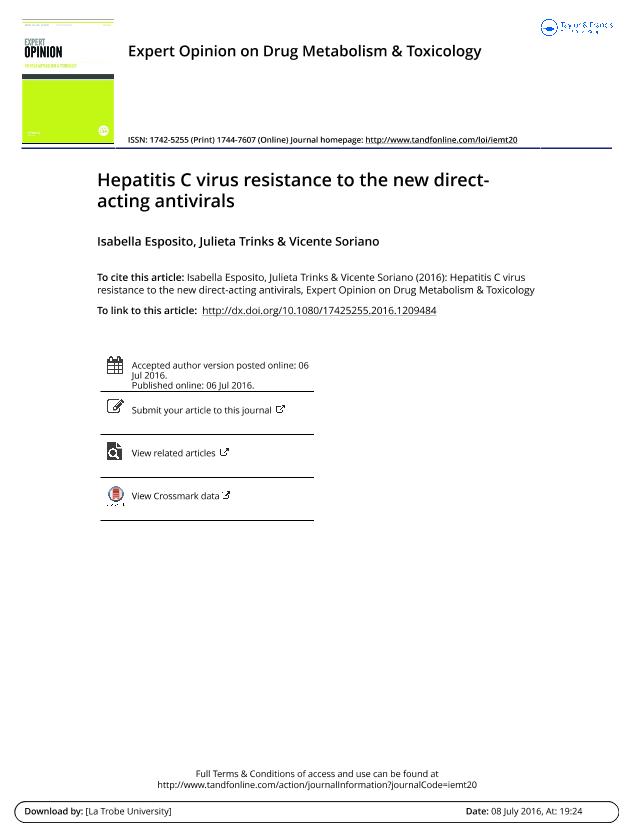Mostrar el registro sencillo del ítem
dc.contributor.author
Esposito, Isabella
dc.contributor.author
Trinks, Julieta

dc.contributor.author
Soriano, Vicente
dc.date.available
2018-05-31T13:42:28Z
dc.date.issued
2016-07
dc.identifier.citation
Esposito, Isabella; Trinks, Julieta; Soriano, Vicente; Hepatitis C virus resistance to the new direct-acting antivirals; Informa Healthcare; Expert Opinion on Drug Metabolism & Toxicology; 12; 10; 7-2016; 1197-1209
dc.identifier.issn
1742-5255
dc.identifier.uri
http://hdl.handle.net/11336/46761
dc.description.abstract
Introduction: The treatment of hepatitis C virus (HCV) infection has dramatically improved in recent years with the widespread use of interferon-free combination regimens. Despite the high sustained virological response (SVR) rates (over 90%) obtained with direct-acting antivirals (DAAs), drug resistance has emerged as a potential challenge. The high replication rate of HCV and the low fidelity of its RNA polymerase result in a high degree of genetic variability in the HCV population, which ultimately explains the rapid selection of drug resistance associated variants (RAVs). Areas covered: Results from clinical trials and real-world experience have both provided important information on the rate and clinical significance of RAVs. They can be present in treatment-naive patients as natural polymorphisms although more frequently they are selected upon treatment failure. In patients engaged in high-risk behaviors, RAVs can be transmitted. Expert opinion: Although DAA failures generally occur in less than 10% of treated chronic hepatitis C patients, selection of drug resistance is the rule in most cases. HCV re-treatment options are available, but first-line therapeutic strategies should be optimized to efficiently prevent DAA failure due to baseline HCV resistance. Considerable progress is being made and next-generation DAAs are coming with pangenotypic activity and higher resistance barrier.
dc.format
application/pdf
dc.language.iso
eng
dc.publisher
Informa Healthcare

dc.rights
info:eu-repo/semantics/openAccess
dc.rights.uri
https://creativecommons.org/licenses/by-nc-sa/2.5/ar/
dc.subject
Hcv
dc.subject
Resistance
dc.subject
Direct Acting Antivirals
dc.subject
Treatment
dc.subject.classification
Inmunología

dc.subject.classification
Medicina Básica

dc.subject.classification
CIENCIAS MÉDICAS Y DE LA SALUD

dc.title
Hepatitis C virus resistance to the new direct-acting antivirals
dc.type
info:eu-repo/semantics/article
dc.type
info:ar-repo/semantics/artículo
dc.type
info:eu-repo/semantics/publishedVersion
dc.date.updated
2018-05-30T14:28:21Z
dc.journal.volume
12
dc.journal.number
10
dc.journal.pagination
1197-1209
dc.journal.pais
Reino Unido

dc.journal.ciudad
London
dc.description.fil
Fil: Esposito, Isabella. Hospital Universitario La Paz; España
dc.description.fil
Fil: Trinks, Julieta. Hospital Italiano. Instituto de Ciencias Básicas y Medicina Experimental; Argentina. Consejo Nacional de Investigaciones Científicas y Técnicas; Argentina
dc.description.fil
Fil: Soriano, Vicente. Hospital Universitario La Paz; España
dc.journal.title
Expert Opinion on Drug Metabolism & Toxicology

dc.relation.alternativeid
info:eu-repo/semantics/altIdentifier/url/https://www.tandfonline.com/doi/abs/10.1080/17425255.2016.1209484
dc.relation.alternativeid
info:eu-repo/semantics/altIdentifier/doi/http://dx.doi.org/10.1080/17425255.2016.1209484
Archivos asociados
